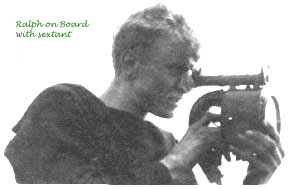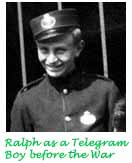

|
|||||
| Ralph Stobart Robson, signalman, life in the British Royal Navy World War Two, sinking of Prince of Wales and the Repulse, Singapore | |||||
|
|||||
|
|||||
|
The southern side facing Bombay was a steep slope crowded with palm trees (not the coconut variety), the northern side a gentler slope with some beautiful neat villas. Then we were up against a guarded barrier, the entrance to a Portuguese fort and what had once been a convent. With my gear I had to dismount and was then conducted up to a series of Indian Army tents where I was shown a bed. This was my first encounter with an army charpoy - a wooden frame with a woven rattan (used to make rope) bed. The other beds had little cupboards alongside them and in addition some had green Navy cases. I wandered around to familiarise myself and saw men marching along the road to the shout of commands. The whole camp had apparently been out on route march in three groups - one of which wore sailor caps, one soldier caps and one Air Force caps. They stopped on the parade ground and were wearily dismissed and I followed some of them into the tent I had been allotted. I made myself acquainted and found out, at last, exactly where I was. This was Royal Navy Beach Signal Section No.3 and consisted of Bunts and Tels with, apart from a P.O. Meaby and a Yeoman of Signals plus two leading hands, about fifteen ratings. The tents were about thirty foot long and twenty foot wide, made of a thick sort of canvas with the sides just over a man's height. They didn't appear to be too securely erected as the pole supports were somewhat shaky and the guys were loose. I wasn't to know it at the time but some of the Royal navy contingent I had studied so closely marching through the gates and now met for the first time in that tent were to be my close companions till the end of the war. There was Tubby Boynton - a midlander who knew as much about signalling as a ship's cook, Jock Kelly - a Glaswegian who had played football for Glasgow Rangers, reputed to have a great future but I think the length of the war put paid to that, Billy Bumstead - a Londoner whose size, six foot two, put paid to snide remarks about his name, and most of all Jeff Barret who was to become a particularly close friend. From this good set of lads I was to learn that our job would be to land in the forefront of any invasion and provide communications between the F.O.O.'s (Forward Observation Officers) and the ships which were to shell positions ashore. We were to be at the head of any advance. This was not particularly good news to me - even worse was the fact that we were to be given no "Tots" (issues of rum) and we only got three meals a day (Army style)! There were other restrictions but those two were the worst. |
|||||
|
|||||
